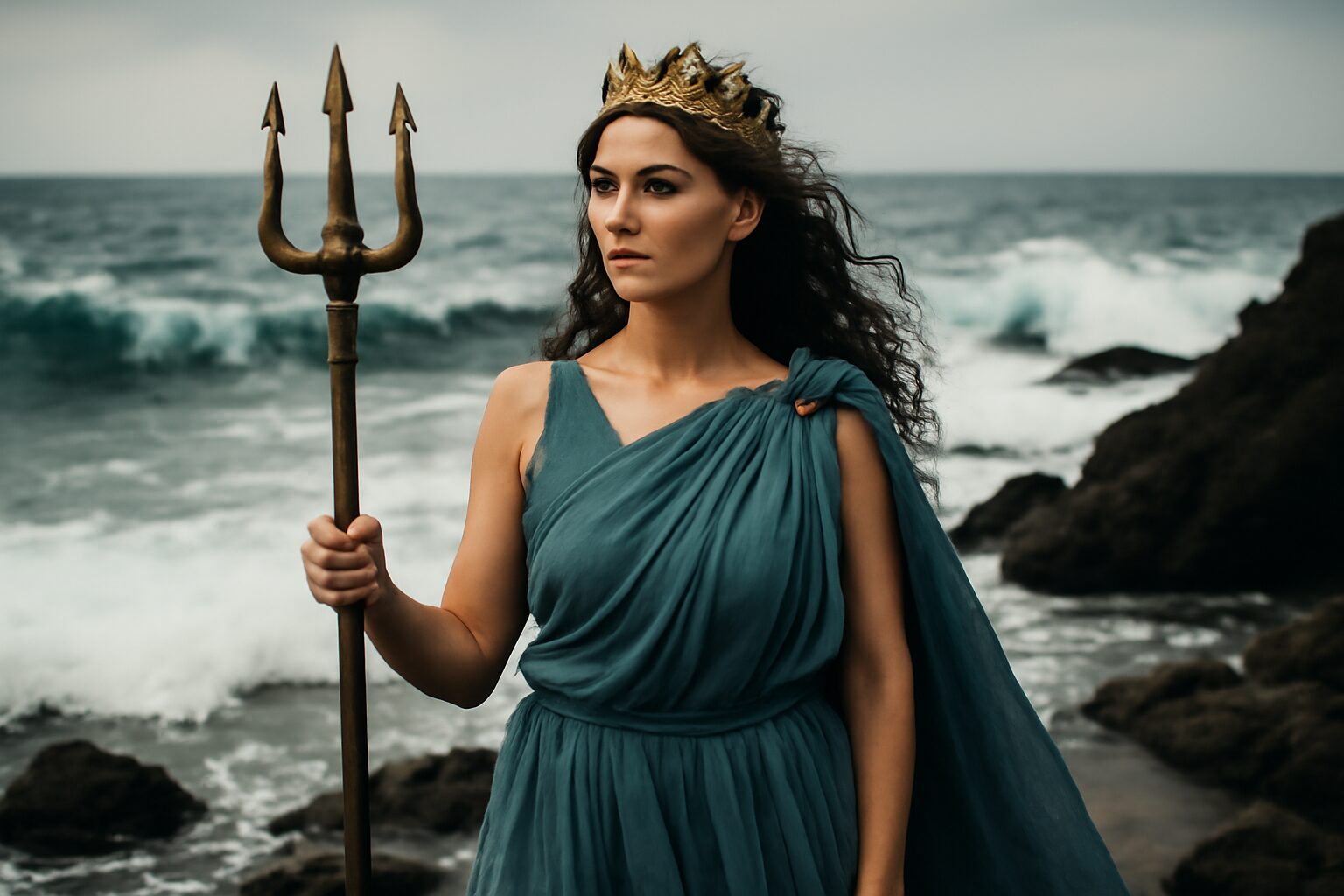Eurybia: The Titan Goddess of the Sea's Dominion
In the vast pantheon of Greek mythology, Eurybia stands as a lesser-known but powerful Titan goddess, embodying the mastery of the seas and the forces of nature. As the daughter of Pontus (the primordial sea) and Gaia (the Earth), Eurybia was born into a lineage of immense power, bridging the realms of land and ocean.
Mythology and Lineage
Eurybia's name translates to "wide force" or "far power," reflecting her dominion over the uncontrollable might of the sea. She married the Titan Crius, and together they bore three significant children: Astraeus (god of dusk and stars), Pallas (god of warcraft), and Perses (god of destruction). Through her offspring, Eurybia's influence extended into celestial, martial, and chaotic domains, linking her to the broader forces of the cosmos.
Powers and Significance
Unlike the more famous sea deities such as Poseidon or Oceanus, Eurybia represented the raw, untamed power of the sea—its storms, currents, and unyielding force. She was revered not for nurturing sailors but for commanding the sea's fearsome aspects. Ancient Greeks saw her as a personification of nature's indomitable will, a reminder of humanity's vulnerability before the elements.
Though rarely worshiped directly, Eurybia's legacy persisted through her descendants. Her grandson, Zephyrus (the west wind), and her great-grandson, Heracles, tied her lineage to both natural phenomena and heroic myths. Her presence in the Theogony by Hesiod underscores her role in the divine order, bridging the Titans and the Olympians.
Relationships and Symbolism
Eurybia's marriage to Crius, a Titan associated with heavenly constellations, symbolized the union of sea and sky—a cosmic balance. Her children further connected her to fundamental forces: Astraeus governed the stars, Pallas embodied strategic warfare, and Perses represented ruin and decay. This triad reflects the ancient Greek understanding of creation, conflict, and destruction as intertwined forces.
While Eurybia lacks the vivid myths of Olympian gods, her quiet authority in the background of Greek cosmology highlights the Titans' enduring influence. She remains a testament to the primal, often overlooked powers that shaped the world before the reign of Zeus and his pantheon.
Alternative Names for Eurybia,
God Name: u0395u1f50u03c1u03c5u03b2u03afu03b1 (Greek)
This is the original Greek name of the goddess Eurybia, meaning 'wide force' or 'wide strength,' derived from the elements 'eurys' (wide) and 'bia' (force).
God Name: None attested (Roman)
There is no direct Roman equivalent or alternative name for Eurybia in classical mythology. She is primarily known by her Greek name.
God Name: Thalassia (Greek (epithet))
An epithet sometimes associated with Eurybia, linking her to the sea (Thalassa), as she was considered a marine deity, the daughter of Pontus and Gaia.
Tales about Eurybia,
Eurybia and the Winds of Astraeus
In the age when the world was still young, Astraeus, the god of dusk and the stars, sought to master the wild, untamed winds that swept across the cosmos. He turned to Eurybia, the mighty Titaness of mastery over the seas, whose power was as deep and unyielding as the ocean abyss. Together, they forged an alliance to bring order to the chaotic gales that threatened to tear the very fabric of the sky.
Eurybia, with her formidable strength, tamed the fiercest of the tempests, while Astraeus charted their courses among the constellations. Their collaboration gave birth to the Anemoi, the four directional winds—Boreas, Notus, Eurus, and Zephyrus—each entrusted with a season and a purpose. This tale is often recounted to illustrate how cooperation between the celestial and the marine realms brought harmony to the natural world.
Eurybia’s Counsel to Perses
When Perses, the Titan of destruction and peace, found himself torn between his dual nature, he journeyed to the depths of the sea to seek the wisdom of Eurybia. Known for her unshakable will and mastery over the forces of nature, Eurybia listened as Perses confessed his struggle to balance creation and ruin.
With the patience of the deep ocean, Eurybia advised him: "True power lies not in choosing one path over the other, but in understanding when to unleash the storm and when to grant calm." She shared stories of the sea’s own rhythms—the fury of waves and the serenity of still waters—teaching Perses that destruction could pave the way for renewal. Inspired, Perses returned to the world with a newfound equilibrium, and it is said that Eurybia’s counsel helped shape the cycles of decay and rebirth that define existence.
Frequently Asked Questions
Who is Eurybia in Greek mythology?
Eurybia is a lesser-known figure in Greek mythology, a Titaness who represents mastery over the seas. She is the daughter of Gaia (Earth) and Pontus (Sea) and is known for her power over the winds and waves, influencing the forces of nature.
What are the Titans in Greek mythology?
The Titans were the first generation of divine beings in Greek mythology, preceding the Olympian gods. They were the children of Gaia (Earth) and Uranus (Sky) and ruled during the Golden Age. The most famous Titans include Cronus, Rhea, and Oceanus.
Why are the Titans important in Greek mythology?
The Titans are important because they were the predecessors to the Olympian gods and played a key role in the creation myths. Their overthrow by Zeus and the Olympians marked the transition to a new era of divine rule, shaping many Greek myths and legends.
How does Eurybia relate to the other Titans?
Eurybia is part of the second generation of Titans, as the daughter of Gaia and Pontus. She is often associated with the sea and is the mother of important sea deities like Astraeus, Perses, and Pallas, linking her to other cosmic forces in Greek mythology.
What can we learn from the stories of the Titans today?
The stories of the Titans teach us about ancient Greek beliefs in power struggles, the forces of nature, and the cyclical nature of time and leadership. They also reflect themes of rebellion, destiny, and the balance between chaos and order, which remain relevant in modern storytelling.













